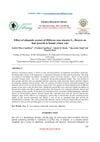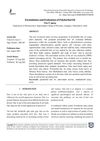 10 citations,
March 2015 in “PubMed”
10 citations,
March 2015 in “PubMed” Scalp micropigmentation, a cosmetic tattoo technique, is a promising non-surgical treatment for hair and scalp deformities, despite potential complications.
 5 citations,
February 2022 in “Acta Biomaterialia”
5 citations,
February 2022 in “Acta Biomaterialia” Nanomaterials can improve hair care products and treatments, including hair loss and alopecia, by enhancing stability and safety, and allowing controlled release of compounds, but their safety in cosmetics needs more understanding.
 4 citations,
October 2022 in “Journal of Imaging”
4 citations,
October 2022 in “Journal of Imaging” An intelligent system can classify hair follicles and measure hair loss severity with reasonable accuracy.
[object Object]  4 citations,
March 2021 in “International Journal of Dermatology”
4 citations,
March 2021 in “International Journal of Dermatology” COVID-19 and related stress may increase hair loss known as Telogen effluvium.
 2 citations,
May 2021 in “Scientific Reports”
2 citations,
May 2021 in “Scientific Reports” Stress is likely causing hair loss in Formosan macaques.
 1 citations,
July 2022 in “Frontiers in Microbiology”
1 citations,
July 2022 in “Frontiers in Microbiology” MSM supplementation in kittens improves hair quality and growth rate without harming their health.
 August 2024 in “Cosmetics”
August 2024 in “Cosmetics” K18® and Olaplex® both effectively repair bleached hair, improving its strength, smoothness, and overall health.
 February 2024 in “International Journal of Dermatology”
February 2024 in “International Journal of Dermatology” The document concludes that more local research on African skin and hair is needed despite increased scientific output from Sub-Saharan Africa.
[object Object]  February 2024 in “Medicina-lithuania”
February 2024 in “Medicina-lithuania” Obesity and bariatric surgery can cause hair thinning and temporary hair loss due to nutritional deficiencies and stress.
 November 2023 in “International Journal of Cosmetic Science”
November 2023 in “International Journal of Cosmetic Science” Wheat polar lipid complex reduces hair loss and improves hair growth in women.
 80 citations,
April 2006 in “Clinical Interventions in Aging”
80 citations,
April 2006 in “Clinical Interventions in Aging” Minoxidil and Finasteride are effective for male baldness; more research is needed for hair aging treatments.
51 citations,
January 2014 in “International journal of trichology” Shampoo pH can affect hair health, with alkaline shampoos potentially causing damage and acidic shampoos reducing frizz.
 48 citations,
February 2017 in “Journal of Cosmetic Dermatology”
48 citations,
February 2017 in “Journal of Cosmetic Dermatology” The conclusion is to use scalp cooling, gentle hair care, and treatments like minoxidil for managing hair loss from chemotherapy, and stresses the need for more research and collaboration in this area.
 41 citations,
March 2007 in “Journal of dermatological science”
41 citations,
March 2007 in “Journal of dermatological science” Taking L-cystine and vitamin B6 can prevent hair loss caused by smoke in mice.
 39 citations,
January 2012 in “International Journal of Trichology”
39 citations,
January 2012 in “International Journal of Trichology” Melatonin solution helps treat hair loss in men and women.
 35 citations,
November 2020 in “Dermatologic Therapy”
35 citations,
November 2020 in “Dermatologic Therapy” Severe COVID-19 may cause hair loss, and doctors recommend supplements and topical treatments to manage it.
 22 citations,
March 2020 in “Cosmetics”
22 citations,
March 2020 in “Cosmetics” Nanotechnology improves minoxidil treatment for hair loss.
11 citations,
January 2017 in “Journal of research in pharmacy practice” The combination of zinc sulfate and calcium pantothenate effectively controls early-stage hair loss.
 11 citations,
February 2011 in “Current Zoology”
11 citations,
February 2011 in “Current Zoology” About 20% of Japanese macaques had head alopecia, and stress and environment might cause hair loss.
 10 citations,
May 2018 in “Forensic Science International”
10 citations,
May 2018 in “Forensic Science International” Shrunken heads retain some facial features and hair characteristics, allowing for limited individual identification.
10 citations,
October 2001 in “PubMed” The conclusion is that substances can penetrate hair fibers through multiple pathways, including both the cell membrane complex and the non-keratinous parts.
8 citations,
January 2020 in “PeerJ” Alopecia Areata causes significant structural and compositional changes in hair.
 7 citations,
December 2021 in “Pharmaceutics”
7 citations,
December 2021 in “Pharmaceutics” Natural products like plant extracts can help promote hair growth and could be used to treat hair loss.
 4 citations,
January 2011 in “Der Pharmacia Lettre”
4 citations,
January 2011 in “Der Pharmacia Lettre” Hibiscus flower extract slowed down hair growth in rats.
 3 citations,
February 2021 in “Evidence-based Complementary and Alternative Medicine”
3 citations,
February 2021 in “Evidence-based Complementary and Alternative Medicine” The Chinese herbal supplement BeauTop can potentially boost hair growth and thickness by increasing a protein called Vascular Endothelial Growth Factor.
 3 citations,
October 1988 in “Clinics in Dermatology”
3 citations,
October 1988 in “Clinics in Dermatology” Using 3% topical minoxidil can help women with hair loss, but more research is needed.
 1 citations,
August 2021 in “International journal of scientific research in science and technology”
1 citations,
August 2021 in “International journal of scientific research in science and technology” The polyherbal hair oil promotes hair growth, reduces hair loss, and is safe to use.
 January 2025 in “Cosmetics”
January 2025 in “Cosmetics” Astragalus sinicus extracts may help promote hair growth and treat hair loss.
 December 2024 in “Research Square (Research Square)”
December 2024 in “Research Square (Research Square)” Placental stem cell exosome therapy improves hair growth and reduces hair loss.
 November 2024 in “Journal of Natural Remedies”
November 2024 in “Journal of Natural Remedies” Herbal ingredients can effectively promote hair growth and improve hair health.


























